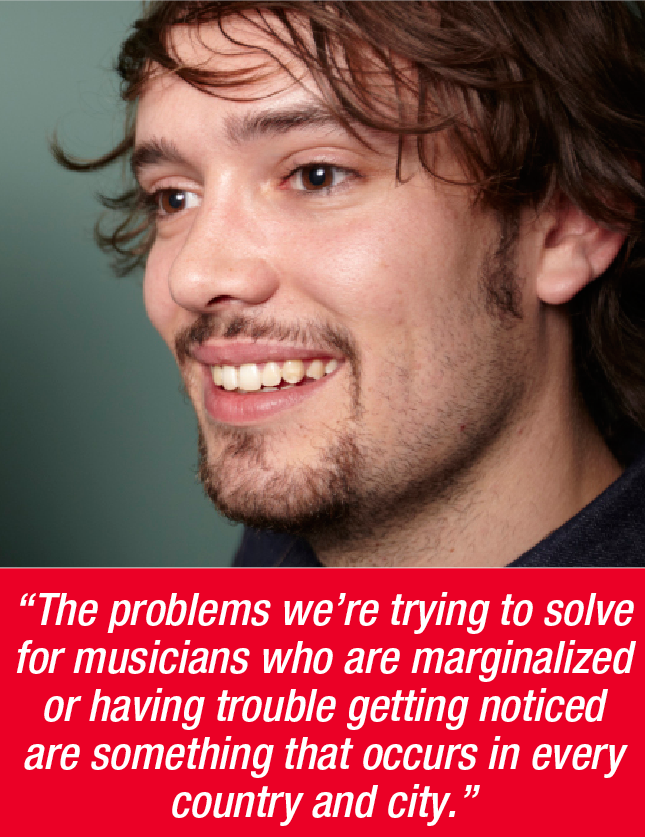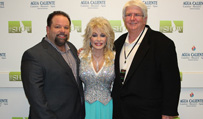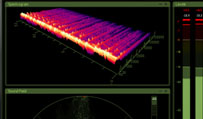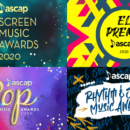 Ben Lovett
Ben Lovett
President / CEO
Communion
Years with Company: 7
Address: #7 W. 22nd St., New York, NY 10010
Phone: NA
Web: http://communionmusic.co.uk
E-mail: NA
Clients: Mikhael Paskalev, the Trouble With Templeton, Caveman, Willy Mason, Half Moon Run, Story Books, Michael Kiwanuka, Bear’s Den, Deap Vally, Joe Banfi, Pale Seas, Gabriel and the Hounds, To Kill A King, Nathaniel Rateliff, Treetop Flyers, Ben Howard, Three Blind Wolves, more.
BACKGROUND: Best known as one fourth of Grammy-winning English folk-rock band Mumford & Sons, Ben Lovett co-founded Communion in 2006. The label, promotion outfit and touring platform concentrates on unsigned acts and assumes an artist-friendly approach that has lifted acts like Gotye, Daughter and Edward Sharpe and the Magnetic Zeros to prominence. Last year, they crossed the Atlantic and invaded America.
Going West:
I founded [Communion] with two other people in the U.K., Kevin Jones and Ian Grimble. For the past couple years, we’ve been operating the North American division of Communion from the U.K., releasing certain records like Ben Howard and Michael Kiwanuka in America. In 2013, I took control of the company on the ground here. I’m living in New York full-time and building out the company.
Showcasing Talent:
We started as a promotions company. The core of the Communion business model is in our club nights and live promotions. We started running a monthly party in London and we would have five or six new bands who we thought were the best undiscovered artists around. It was an opportunity to provide a platform for musicians and create a one-stop shop for people wanting to discover stuff. That monthly event has grown to 25 cities in five countries.
We’ve also grown in distribution. We promote hundreds of shows a year. We do shows up to about 5,000 capacities. And then we release records and publish songwriters. A lot has happened in the last eight years, but the inception was all about showcasing talent as best we could.
Everyone’s Problems:
I’ve always had a dream of living [in America], but the things we’re addressing are not specific to being British. The problems we’re trying to solve for musicians who are marginalized or having trouble getting noticed are something that occurs in every country and city. It just made sense to start working on that in America.
Let Artists Be Artists:
It’s very hard to be a musician. It’s incredibly up to chance and difficult to get noticed. How do you build a fan base? You see people doing everything they can to promote themselves even though they’re not naturally a promoter; they’re naturally songwriters. They’re pressing CDs and writing press releases, but they’re not manufacturers or press agents. But at that early stage, there’s no one to help do those things.
Chicken V. Egg:
I remember playing gigs in 2006. We would play a show and the only people who turned up were our friends and family. And when we finished playing, the person putting on the show told us we hadn’t reached the threshold to get paid anything. So we had driven to the venue, paid for parking, did the gig and didn’t get paid a penny. It’s not our responsibility to fill the room. That’s the responsibility of a promoter. So for the last eight years, I’ve done everything I can to become as passionate a promoter as possible and get people to see music they might not know. More so than ever, people just want to see a band they already know. How are bands ever going to become a band that people want to see if they don’t support them? It’s a bit of a chicken or the egg situation.
The Hook Up:
As a promoter, record label and publisher, on all sides we are looking for new musicians. We’re also looking for people to work with us on the industry side of things. Each [artist we find] is different. Sometimes, it’s a recommendation by a friend. Sometimes, you read something. Sometimes, you see something at a show. Often, it’s through the club nights. The club nights have gotten us a lot of our talent, because that’s the initial booking. We’ll provide an opportunity for an act to play the show and we’ll get to know them better. Then we’ll ask them to play one of the other cities. A good example of that is the Districts out of Philadelphia. I saw them and they blew me away. I’ve discovered stuff watching TV. We found this video of two girls playing in an art gallery in Los Angeles. They blew our mind and we asked if they wanted to work with us.
Differing Deals:
We do lots of different deals. The three companies are separate, so we publish some artists, release some artists’ records and promote some. Some artists we work with on all three sides. But we strive to lay out a proposal that is how the artist would want to be treated and handled. We always work from their perspective. There’s never any small print or hidden traps, because we don’t have an interest in doing that.
Club Life:
In the U.S., we’ve organized [our club nights] so you can play all the dates in one month, but it’s more about a monthly residency in each city. We have had some bands play all the shows. A lot of people start with their town and then they’ll do a few more. So we do stuff like cross-pollinating and cross-promoting between markets. Some artists will have a bigger draw and can help benefit others. It’s less a competitive atmosphere than a communal and supportive one.
It’s Not About Profits:
Our intentions are always to be supportive and work in the favor of the artist. We’re not driven by profits. We don’t have much by way of overhead, so we haven’t got any pressure to commercialize any musician who doesn’t want to be. We focus on helping an artist be the best they can be. We try not to put everyone through the same mold and don’t just push music out. And we tend not to throw money at stuff and hope it works, because we can’t really risk doing that. We very much consider everyone who’s with us to be part of our family.
The Old Ways Work Best:It’s important not to forget the basic level that people like music. People listen to music on the radio. People read magazines. People use iTunes to buy music. People go to big retail outlets and still buy CDs. And people do still buy vinyl. The more traditional ways that people digest music still work. Even though you may come up with some crazy, new way to monetize music, I’m always a bit skeptical. I always listen and investigate, but you’ve got to remember that the public are not concerned about that stuff. They just want to hear good music and if they like it they’ll invest in it.
Getting Behind Artists When It Counts:
People are in the habit of just investing in bands they already like. I’m hoping that, through the Communion club nights, we’re going to show people there’s a lot more music out there. They just need to take one step forward, take that risk and it’ll almost always pay off. There are thousands of unsigned bands kicking around each of these major cities and we’re going out there finding the best ones and putting them on a stage. At that point, people can discover their new, favorite bands. There’s something special about that moment. One of my favorite things about music is being one of the first to hear a band and then supporting them as they grow, instead of waiting for a magazine to put a band on their cover, at which point they’re heavily invested in and there’s a whole machine behind it.
Making Audiences Into Tastemakers:
I’d love there to be a Communion club night in every city all over the world. And I’d love for us to be able to elevate bands to where not only they’re getting these opportunities we want to provide them but where people have a richer and broader taste of what music is out there. And I think that by doing that people will start to decide the future trends of music, rather than major labels and publications that currently steer what people hear and invest in.












